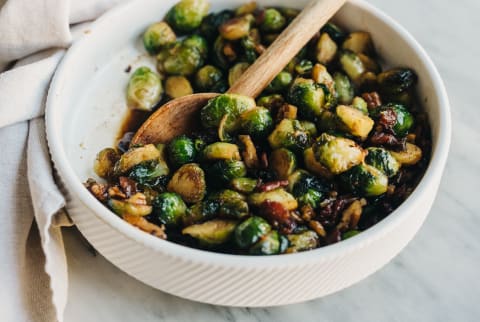Brussels Got You Bloated? An ND Explains Why & How To Avoid It


Sulfur is one of the most abundant minerals1 found in the body, following calcium and phosphorus. So it's no wonder naturopathic doctor and New York Times bestselling author Kellyann Petrucci, M.S., N.D., advocates for sulfur-rich diets, which help to naturally cleanse the body. Unfortunately, most sulfur-rich foods, like cruciferous vegetables, can lead to bloating. So, how do we eat healthy and combat the discomfort?
During a mindbodygreen podcast, Petrucci explained why certain vegetables—hello, Brussels sprouts—can cause bloating and the best way to manage those gut reactions.
"A lot of people when they're on their health journey...have to start with repopulating the gut," she said. "When your body is fighting to get repopulated and healthy, a lot of times these vegetables [Brussels sprouts, broccoli, cauliflower, and cabbage] will blow you out."
The discomfort of bloating—though temporary and necessary to create a healthy gut—might lead people to assume the veggies are causing more harm than good. But instead of reducing your intake, try preparing them differently.
How to prepare your veggies to manage bloat.
If you're at the beginning of your health journey, Petrucci recommends steaming your vegetables. "Let your body get its magic back before you start having these vegetables raw," she said.
Although they're healthy raw, these crunchy veggies can be hard to digest, especially in large quantities. "It just takes time," she assured us, but eventually our guts will repopulate with healthy bacteria and be able to tolerate their intensity.
Along with these sulfur-rich foods, though, Petrucci recommended her favorite anti-bloating foods to accompany hard-to-digest greens.
What to eat to manage bloat.
"My favorite [bloat-busting] food is avocado," she said. "I think I could do back flips when I talk about avocados." The small green fruit—yes, it's a fruit and it's keto-friendly—is a simple but effective relief to severe bloating, according to Petrucci.
Salmon, blueberries, and lemon water are also beneficial, not only for the gut but also for the skin.
"It seems like an oversimplification and when people don't hear big words...they think 'well, it can't be good enough,'" Petrucci said. "We have to change that paradigm of thinking." Returning to simple solutions is the best way to get your body what it actually needs and help it reach a flow state.
In that flow state, she said, our bodies will be able to digest and metabolize properly, which helps to eliminate bloating. Of course, a healthy addition of prebiotic and probiotic-rich foods and supplements can also help support a healthy gut.

Abby Moore is an editorial operations manager at mindbodygreen. She earned a B.A. in Journalism from The University of Texas at Austin and has previously written for Tribeza magazine. She has covered topics ranging from regenerative agriculture to celebrity entrepreneurship. Moore worked on the copywriting and marketing team at Siete Family Foods before moving to New York.
